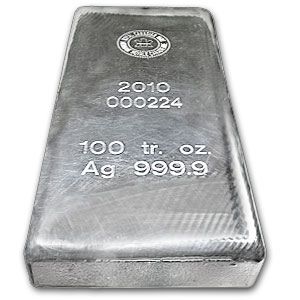In 1984, Michigan resident Laurin Ramsey purchased 10 pieces of 100 ounce pure silver bars from the Swiss bank UBS or its Paine Webber subsidiary. Ever since, he had paid $25 per month for storage fees.
A few years ago, he tired of paying the storage fees and contacted the bank to arrange delivery.
 Instead of delivery, Ramsey only got the runaround. When he finally asked to be given the serial numbers on the bars and the location of the vault where they were stored, he was told that the bars did not have serial numbers (not true!).
Instead of delivery, Ramsey only got the runaround. When he finally asked to be given the serial numbers on the bars and the location of the vault where they were stored, he was told that the bars did not have serial numbers (not true!).
Mr Ramsey started calling Patrick Heller of Liberty Coin Service for advice on standard industry practices and for ideas on how he could take delivery of these bars.
At one point, the bank said his only option was to sell the bars back to the bank for cash. But Mr Ramsey did not want to close out his position.
On February 23, 2011, the Ramsey Personal Trust, by Laurin D. Ramsey was the lead plaintiff in a suit filed in the Federal District of Southern New York against UBS Financial Services, Inc., et al. The case number is 1:2011cv01256. Presiding judge is Jed S. Rakoff. The charges are that UBS had never purchased, segregated, or stored the silver, then had illegally charged storage fees for the phantom silver.
The lawsuit can be found here: http://www.gata.org/files/RamseyV.UBS_.pdf
 Avery Goodman explains the suit in his Seeking Alpha article,
Avery Goodman explains the suit in his Seeking Alpha article,
“According to the lawsuit, customers were charged storage fees every month, even though the bank was not actually storing anything. It never purchased any physical silver. Instead, the bank allegedly used customer cash for its own purposes. In effect, customers ended up buying a non-interest bearing silver bond. Such bonds, based on a promise of repayment in precious metals, were typically issued in the late 19th and early 20th century. Back then, they bore a nice interest rate, payable in gold or silver. Today’s version of the precious metal bond is unallocated storage, which takes money from investors but pays them nothing at all.
A very similar lawsuit was filed, in 2007, against Morgan Stanley (MS). In that case, small investors were also claiming they had been defrauded into participating in unallocated metals storage. The bank defended itself by alleging, among other defenses, that it was simply following standard industry practices. In other words, the amount of information given to customers, the unallocated nature of the scheme, as well as the charging of “storage fees” for imaginary metal were “standard industry practices”. In light of what we now know, maybe they were telling the truth. Morgan Stanley did eventually settle for a multi-million dollar payout, but it continued to deny liability. UBS has not yet answered. We don’t know yet what their response may be.
The law firm representing the plaintiffs is Schoengold & Sporn, P.C. The individual attorney handling the case is Samuel E. Sporn. He can be reached at 212- 964-0046 and welcomes calls from anyone concerned about storage fees they have paid to UBS.
In 2007, Sporn was the attorney who won the $4.4 million judgment against Morgan Stanley mentioned above.
http://www.reuters.com/article/2007/06/12/idUSN1228014520070612





I’m not shocked: I’ve read that UBS cheated the USA out of alledgedly $12 BILLION in taxes by creating offshore accounts for tens of thousands of clients (they were ultimately fined $700 million by the US Feds). I find nothing that UBS does shocking. Greed. Greed. Greed. I even heard of UBS until I started researching Bernie Madoof’s ponzi scheme in 2008: Vanity Fair named Maddoff, AIG, and UBS the most fraudulaent monetary institutions in 2009.
Oops..I meant I NEVER heard of UBS until I researched Maddoff….